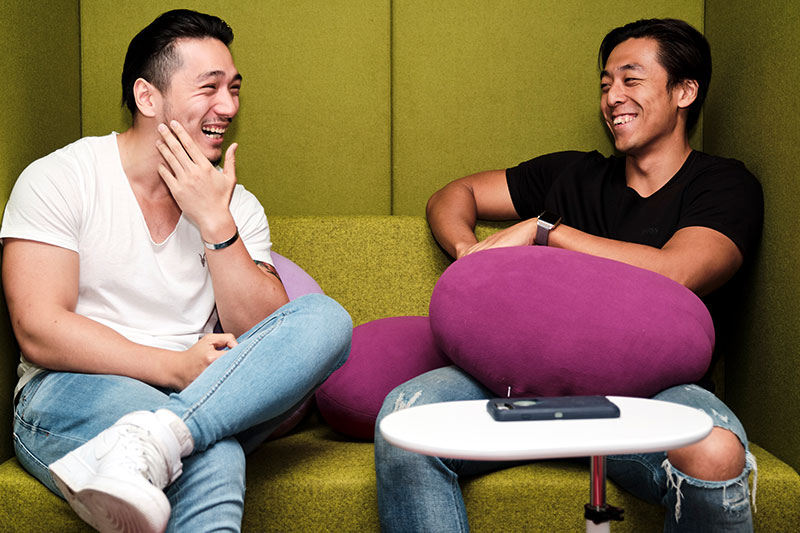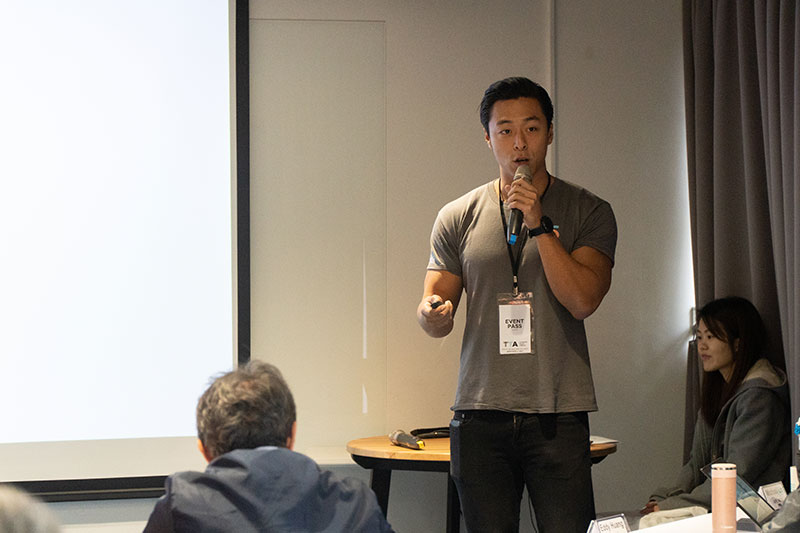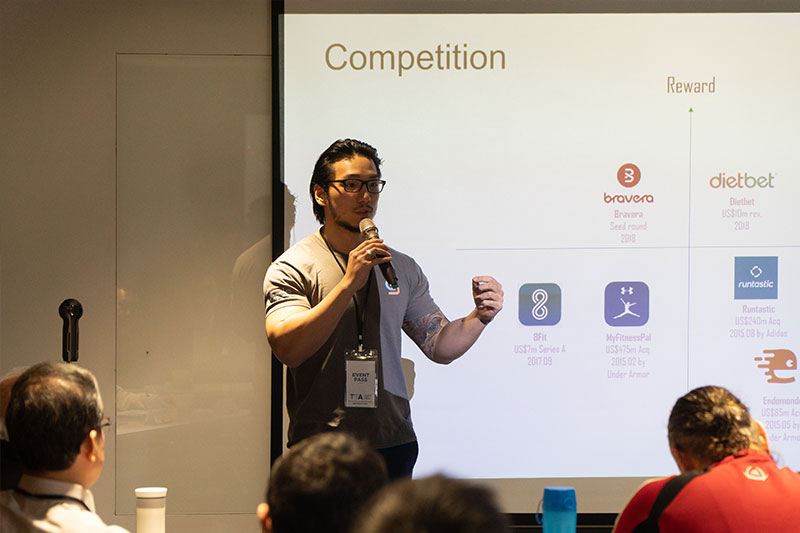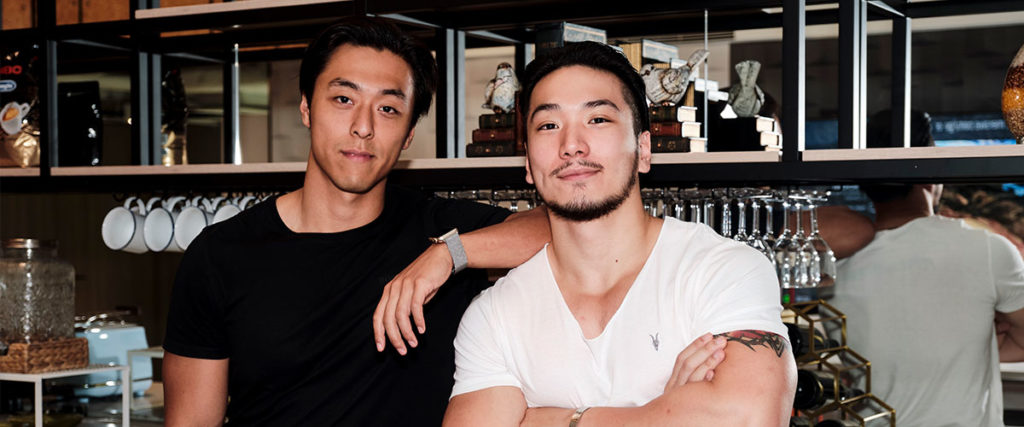Stryde co-founders Leon Lee and Alex Chung have created an innovative fitness app that uses an in-game currency to motivate people to get moving. Here’s how they did it.
From London to Hong Kong, Leon Lee and Alex Chung bonded over a mutual love for health and fitness that eventually led them to create Stryde in 2017 – an innovative goal-betting mobile app for fitness enthusiasts. As the first of its kind, the app is a modern reinvention of peer-to-peer accountability in a game-like simulation. It works by having the user’s fitness goals publicly logged and then betted on by others through Stryde’s own in-app currency. Hard-earned points can then be accumulated and exchanged for real-life goodies like MuscleXP Vitamins and Nike sport shirts, providing strong incentive on both ends to stay motivated in achieving their fitness goals.
As respective biotechnology and marketing graduates, Leon and Alex’s startup journey within the notoriously difficult tech space was not without its hurdles. They’ve come together to share their personal journey – and how they succeeded in spite of the challenges they faced.
How did the idea for Stryde come together?
Leon: It started off as a fun little exploratory conversation about opening a gym in Hong Kong. We wanted to deliver an online experience – an app that goes with the gym. Slowly, we realised that the potential for the app was a lot higher than that for the gym, given the expensive rent in Hong Kong.
One of the biggest reasons people aren’t hitting their fitness goals isn’t because they don’t know what to do, but because they lack the motivation to see it through. So the focus of the app became to motivate people. And one of the biggest drivers of motivation is accountability – whether it be to yourself, your coach, or to each other.

Can you walk me through how the app works?
Alex: The initial idea was very simple. We have an algorithm that gives you achievable goals and milestones for you to attack. Once that goal is set and made public, then other people get to “believe” or “doubt” the goal. For example, people will be made aware of my weight-loss goal and invest a little bit of their emotion through betting on it. If I achieve my goal, I will be rewarded with my weight loss and, in turn, they will be rewarded with in-app currency and/or in-app prizes.
Given your educational backgrounds, how important is having a tech background in running your business?
Leon: We started off with a minimal tech background. I studied biotechnology so my experience was more in genetic engineering and laboratory work. I’ve only recently been doing two courses on software engineering, specifically related to mobile apps. I would say there’s definitely an edge if the team itself has the knowledge and skill to make technological decisions. Even if you outsource a team to create the product for you, you still want to understand all the options and make strategic, educated decisions behind the outcome.
Alex: Yeah, in terms of the technical side of things, I let Leon and our development team rattle on in their Star Trek coding language and I just listen in. But I’m very involved in user experience and the flow of the app – that’s really where I contribute. Because the industry we operate in is fitness, health, and wellness, my background as a personal trainer also helps. I want to make sure that decisions are being made in consideration of the user’s perspective, contributing to help them reach their fitness goal, rather than just making a better game.
What were some of the challenges in building a startup in Hong Kong?
Leon: Hong Kong is not the most startup-friendly city. Places like Silicon Valley, Shenzhen, Beijing – their whole ecosystem is built more for startups. I’m not just talking about investors and funding. It’s also incubators, as well as the other startups and mentors there. In that kind of environment, you tend to learn faster, move faster, and get validation easier. Sometimes over here, you’re working on your startup, while everyone else around you is in banking jobs, pulling in a relatively higher salary. You know you could suddenly run out of money, out of business deals, have customers turn… but you just have to keep on going. At the end of the day, it’s all about whether you can actually stay persistent, despite all this. Persistency is one big characteristic of successful startups that I definitely look up to.
Alex: I think there are certain industries that the Hong Kong market enjoys investing in and contributing to – HealthTech, FinTech, things like that. We come across like a social platform more than anything, so I think it’s hard to get the backing in this city. The financial requirements are relatively higher than say other brick and mortar businesses.
So, considering these challenges, how did you guys first break into the industry?
Alex: As a startup, you’re not exactly flooded with resources, so the importance of finding partners, sponsorships, and things like that really come into play. I’m a believer that you can hire talent, but you can’t hire character. Especially when you’re just breaking into the scene, you have to be good with people – that soft skill is really important.
We’ve been focused on making really good connections, and part of how we’ve been rolling out our platform is through micro-influencers here in Hong Kong. A couple of them were friends, and a few of them we just reached out to on Instagram. With their following and connections, we actually met a lot of key people through them. In the startup world, everybody kind of wants to help each other out anyway – the scene here is quite small and niche, so once you know a couple of people, you’ll realise that everybody in that circle is connected.

What tips do you have for establishing product-market fit?
Alex: For establishing product-market fit, do your homework and know who you’re playing with. You’ve got to understand your specific product – what aspect of the market are you in? In the beginning stages of Stryde, we made a lot of assumptions about what we thought the market wanted and that led to a few iterations of the product that definitely weren’t the right call. Getting to know your potential end-users and your target demographic is a key part in establishing product-market fit.
What’s the hardest part about product development?
Leon: I think the hardest part of product development is prioritising features. If you want to roll out your product so that people can try it, you need to prioritise the feature that is the unique selling point and really hammer down on that instead of adding a lot of bells and whistles to it. There’s always going to be a list of things that can potentially improve the product – perfectionism might be one of the biggest challenges when it comes to product development.
How did you create your first minimum viable product (MVP)?
Leon: So, you create the MVP to show people how your product works and to get some sort of validation. That was definitely a hurdle at the beginning. We didn’t have the ability to create a functioning MVP, so we created a ‘prototype’ of wireframes – a series of screens connected so that users and testers can experience how the app feels like in their hand, on their phone. To really test out the idea is a small barrier to entry, but for our first actual functioning MVP, we hired someone from the Philippines to develop it.
What metrics do you use to judge success in a tech start-up?
Alex: For our business specifically, the metric we look at relates back to the core value we bring to our users. So, for us, first and foremost is how many people we’ve helped to achieve their goal. Obviously, monthly active users and your standard metrics are very important as well. But, if at the end of the day, the number of goals achieved on our platform is not up to par, we won’t find that to be a great success. To a certain extent, fitness, health, and wellness are all about adherence right? So retention over time is also something that’s quite important – I think it boils down to these two things.

How do you think the COVID-19 pandemic has changed the way tech start-ups operate – and how do you think they need to adapt to survive?
Leon: I think this is going to affect a lot more of the growth-stage start-ups. If you look at Stryde, I’d say we’re in the product stage where we’re not pumping money into marketing yet. For those start-ups who are in the growth stage, it might impact them a lot more because consumers are less likely to spend. It also depends on the product you’re serving. However, for us, I think it gave us more time to actually find the product-market fit.
Alex: The broader answer is that this has definitely made some changes in consumer behaviour. One of them being that people are now a lot more health-conscious than before, so that kind of benefits us in a way. “Health and fitness” and “How do I feel healthy?” – these kinds of search terms are gaining a lot more traffic on Google now. But for tech start-ups specifically, I think it’s just a matter of evaluating the core service that you’re providing. See how you can adapt it to make it easily accessible considering the way people are now having to behave due to lockdown, closed businesses, things of that nature.
Future plans for Stryde?
Leon: In terms of our product development, we are currently on our third public iteration, which we call the Beta-3. At every iteration, we try to let a lot of people try the app and get a lot of feedback. Through this, we found that people don’t really care about a stranger’s fitness goal, hence they wouldn’t really bet on it. So in the newest beta, we are implementing this close group game-style. For example, you can create a fitness challenge, invite your friends to join with you, set the wager, and at the end of the challenge, the winner splits the pot. We’re also including more content-sharing styles as well – so that’s it for the short term. About long-term future plans, ultimately we do want to get to the US, London, and also other parts of Asia like Thailand and Taiwan.
Related Articles
BASE: How Fitness Founder Jack Thomas Won Asia’s Gym of the Year
6 Success Strategies for Your App Launch
Female Fitness Warrior Talks Strength, Resilience & Career After Battling Cancer





